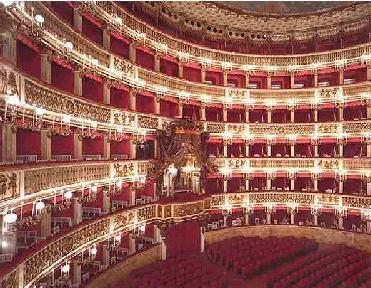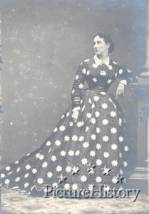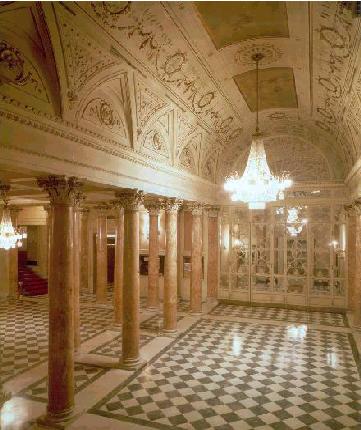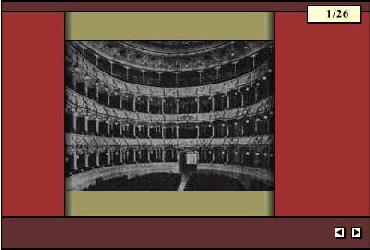
Candida Martinelli's Italophile Site

Main
Page This family-friendly site celebrates Italian culture for the enjoyment of children and
adults. Site-Overview
[George
Henry Lewes, in his book on "Actors and the Art of Acting,"
published by Henry Holt & Co., New York, 1878, says:
"Memoirs
and Artistic Studies of Adelaide Ristori," rendered into English by
G. Mantellini, with a biographical appendix by L. D. Ventura, was
published and copyrighted by Doubleday, Page & Co., New York, 1907.
The chapters of that volume afford the pages which follow.
The Artistic Studies comprise detailed histrionic interpretations
of the chief roles of Ristori: Mary
Stuart, Queen Elizabeth, Lady Macbeth, Medea, Myrrha and Phedra.--ED.] Editor
of e-book:
Adalaide Ristori
WHEN
twelve years old, I was booked with the famous actor and manager,
Giuseppe Moncalvo, for the roles of a child.
Soon after, owing to my slender figure, they made me up as a
little woman, giving me small parts as maid.
But they soon made up their minds that I was not fitted for such
parts. Having reached the
age of thirteen and developed in my figure, I was assigned several parts
as second lady. In those days they could not be too particular in small
companies. At the age of
fourteen, I had to recite the first part among the young girls and that
of the leading lady alternately, like an experienced actress.
It was about this time, in the city of Novara (Piedmont) that I
recited for the first time the "Francesca da Rimini" of Silvio
Pellico. Though I was only
fifteen my success was such that soon afterward they offered me the
parts of leading lady with encouragement of advancement. My
good father, who was gifted with a great deal of sense, did not allow
his head to be turned by such offers.
Reflecting that my health might suffer from being thrown so early
into the difficulties of stage life he refused these offers and accepted
a more modest place, as ingenue, in the Royal Company, under the
auspices of the King of Sardinia and stationed during several months of
the year at Turin. It was
managed by the leading man, the most intelligent and capable among the
stage managers of the time. The
advice of this cultured, though severe man, rendered his management
noteworthy and sought after as essential to the making of a good actor. Among
the members of the company shone the foremost beacon-lights of Italian
art, such as Vestri, Madame Marchionni, Romagnoli, Righetti, and many
others who were quoted as examples of dramatic art, as well as Pasta,
Malibran, Rubini, and Tamburini in the lyric art. My
engagement for the part of ingenue was to have lasted three
years, but, after the year, I was promoted to the parts of the first
lady, and in the third year, to the absolute leading lady.
However,
in the tragic parts, my vigour increased.
I learned to portray transitions for the sake of fusing the
different contrasts; a capital but difficult study of detail, tedious at
times, but of the greatest importance.
The lamentations in a part where two extreme and opposing
passions are at play, are like those which in painting are called "chiaro-oscuro,"
a blending of the tones, which thus portrays truth devoid of artifice. In
order to succeed in this intent, it is necessary to take as model the
great culture of art, and also to be gifted with a well-tempered and
artistic nature. And these
are not to be confined to sterile imitation, but are for the purpose of
accumulating the rich material of dramatic erudition, so that one may
present oneself before the audiences as an original and artistic
individuality. Some
people think that distinction of birth and a perfect education will
render them capable of appearing upon the stage with the same facility
and nonchalance with which one enters a ball-room, and they are not at
all timid about walking upon the boards, presuming that they can do it
as well as an actor who has been raised upon them.
A great error! One
of the greatest difficulties that they meet is in not knowing how to
walk upon a stage, which, owing to the slight inclination in construction, easily causes the feet to totter, particularly if one is a
beginner, and especially at the entrances and exits.
I myself encountered this difficulty.
Though I had dedicated myself to the art from my infancy and had
been instructed with the greatest care every day of my life by my
grandmother, at the age of fifteen my movements had not yet acquired all
the ease and naturalness necessary to make me feel at home upon the
stage, and certain sudden turns always frightened me.
In
our days, the same audience has become less exacting, less critical, and
does not aim to improve the artist, by counting his defects.
According to my opinion, the old system was best, as it is not in
excessive indulgence and solely by considering the good qualities,
without correcting the bad ones, that real artists are made. It
is also my conviction that a person who wishes to dedicate himself to
the stage should not begin his career with parts of great importance,
either comic, dramatic, or tragic.
The interpretation becomes too difficult for a beginner and may
harm his future career: first, the discouragement over the difficulties
that he meets; secondly, an excessive vanity caused by the appreciation
with which the public apparently honours him.
Both these sentiments will lead the actor, in a short time, to
neglect his study. On the other hand, by taking several parts, he becomes
familiar with the means of rendering his part natural, thus convincing
himself that by representing correctly characters of little importance,
he will be given more important ones later on.
Thus it will come about that his study will be more careful. One
of the greatest of the living examples of the school of realism is my
illustrious fellow artist, Signor Tommaso Salvini, with whom, for a
number of years, I had the fortune to share the fatigues and the honours
of the profession which I also shared with Ernesto Rossi. The former was and is still admired. His rare dramatic merits have nothing of the conventional,
but owe their power to that spontaneity which is the most convincing
revelation of art. The
wealth of plasticity which Salvini possesses, is in him, a natural gift.
Salvini is the true exponent of the Italian dramatic art. In
the month of June, 1857, we began to rerehearse "Macbeth," at
Covent Garden, London, It
had been arranged for our company by Mr. Clarke, and translated into
most beautiful Italian verse by Giulio Carcano.
The renowned Mr. Harris put it on the stage according to English
traditions. The
representation of the part of Lady Macbeth, which afterward became one
of my favourite roles, preoccupied me greatly, as I knew only too well
what kind of comparisons would be made.
The remembrance of the marvellous creation of that character as
given by the famous Mrs. Siddons and the traditional criticisms of the
press, might have rendered the public very severe and difficult to
please. I
used all my ability of interpretation to reveal and transmit the most
minute intentions of the author. To
the English audience it seemed that I had really incarnated that
perfidious but great character of Lady Macbeth, in a way that surpassed
all expectations. We
had to repeat the drama for several evenings, always producing a most
profound impression upon the minds of the audience, particularly in the
grand sleep-walking scene. So
thoroughly had I entered into the nature of Lady Macbeth, that during
the entire scene my pupils were motionless in their orbit, causing me to
shed tears. To this
enforced immobility of the eye I owe the weakening of my eyesight. From
the analytical study which I shall give of this diabolical character [at
the close of her Memoirs] the reader can form for himself an idea of how
much its interpretation cost me (particularly in the final culminating
scene), in my endeavour to get the right intonation of the voice and the
true expression of the physiognomy. My
exceptionally good health never abandoned me through my long and
tiresome journeys, though unfortunately I never was able to accustom
myself to voyaging by sea. All
through those rapid changes I acquired a marvellous store of endurance.
That sort of life infused in me sufficient energy to lead me
through every kind of hardship with the resolution and authority of a
commanding general. All
obeyed me. None questioned my authority owing to my absolute
impartiality, being always ready, as I was, either to blame or correct
him who did not fulfil his obligations, also to praise without any
distinction of class those who deserved it.
I almost always met with courtesy among the actors under my
direction, and if any one of them dared to trouble our harmony, he was
instantly put to his proper place by the firmness of my discipline. The
artistic management of the plays was left to me in all its details.
Every order and every disposition came from me directly.
I looked after all matters large and small, the things that every
actor understands contribute to making the success of a play. Concerning
my own personal interests, they were in charge of a private manager. I
am proud to say that my husband was the soul of all my undertakings. As
I speak of him, my heart impels me to say that he ever exercised upon me
and my professional career the kindest and most benevolent influence.
It was he who upheld my courage, whenever I hesitated before some
difficulty; it was he who foretold the glory I should acquire, he who
pointed out to me the goal, and anticipated everything in order that I
should secure it. Without
his assistance I never should have been able to put into effect the
daring attempt of carrying the flag of Italian dramatic art all over the
globe. During
the month of September, 1866, for the first time in my life, I crossed
the ocean on my way to the United States, where I remained until May
17th of the following year. It
was in the elegant Lyceum Theatre of New York that I made my debut, on
the 20th of September, with "Medea."
I could not anticipate a more enthusiastic reception than the one
I was honoured with. I felt
anxious to make myself known in that new part of the world, and let the
Americans hear me recite for the first time, in the soft and melodic
Italian language. I knew
that in spite of the prevailing characteristics of the inhabitants of
the free country of George Washington, always busy as they are in their
feverish pursuit of wealth, that the love for the beautiful and
admiration for dramatic art were not neglected.
During my first season in New York I met with an increasing
success, and formed such friendly relations with many distinguished and
cultured people that time and distance have never caused me to forget
them. While writing these
lines I send an affectionate salutation to all those who in America
still honour me with their remembrance. I
made my fourth trip to London in 1873.
Not having any new drama to present and being tired of repeating
the same productions, I felt the necessity of reanimating my mind with
some strong emotion, of discovering something, in a word, the execution
of which had never been attempted by others. At
last I believed I had found something to satisfy my desire.
The admiration I had for the Shakespearean dramas, and
particularly for the character of Lady Macbeth, inspired me with the
idea of playing in English the sleeping scene from "Macbeth,"
which I think is the greatest conception of the Titanic poet.
I was also induced to make this bold attempt, partly as a tribute
of gratitude to the English audiences of the great metropolis, who had
shown me so much deference. But how was I going to succeed?
... I took advice from a good friend of mine, Mrs. Ward, the
mother of the renowned actress Genevieve Ward. She not only encouraged
my idea, but offered her services in helping me to learn how to recite
that scene in English. I
still had some remembrance of my study of English when I was a girl, and
there is no language more difficult to pronounce and enunciate
correctly, for an Italian. I
was frightened only to think of that, still I drew sufficient courage
even from its difficulties to grapple with my task.
After a fortnight of constant study, I found myself ready to make
an attempt at my recitation. However,
not wishing to compromise my reputation by risking a failure, I acted
very cautiously. I
invited to my house the most competent among the dramatic critics of the
London papers, without forewarning them of the object and asked them
kindly to hear me and express frankly their opinion, assuring them that
if it should not be a favourable one, I would not feel badly over it. I
then recited the scene in English, and my judges seemed to be very much
pleased. They corrected my
pronunciation of two words only, and encouraged me to announce publicly
my bold project. The
evening of the performance, at the approach of that important scene, I
was trembling! ...
The enthusiastic reception granted me by the audience awakened in
me all vigour, and the happy success of my effort compensated me a
thousandfold for all the anxieties I had gone through.
This success still increased my ambitious aspirations, and I
wished to try myself in even a greater task. I
aimed at no less a project than the impersonation of the entire role of
Lady Macbeth in English, but such an arduous undertaking seemed so bold
to me that I finally gave up the idea and drove away from my mind
forever the temptation to try it. [A
PDF version of the entire book is available for free download. It
is an interesting look at how little has changed for actors despite the
advance of modern technology. Acting is surly one of the oldest
professions, and the characters of those called to become actors remain,
most probably, the same as at the beginning of recorded history.
Especially interesting is the section by Edwin Booth, the top actor of
his day in the U.S., who's career took a beating when his younger
brother shot and killed President Lincoln.
Click here to open the PDF version in your Acrobat Reader. Then,
if you want a copy of it, save the book to your computer. For
information on downloading ebooks and the Acrobat Reader, see the free
lessons you can access from the bottom of my site's main
page.]

Adelaide
Ristori: from the book 'Little Masters of Autobiography: Actors
(19th Century)'
![]()
ADELAIDE RISTORI
 "I
must repeat the expression of my admiration for Ristori as a
distinguished actress; if not of the highest rank, she is very high, in
virtue of her personal gifts, and the trained skill with which these
gifts are applied. The
question naturally arises, why is her success so great in certain plays
and so dubious in others? It
is of little use to say that Lady Macbeth and Adrienne Lecouvreur are
beyond her powers; that is only restating the fact.
Can we not trace both success and failure to one source?
In what is called the ideal drama, constructed after the Greek
type, she would be generally successful, because the simplicity of its
motives and the artificiality of its structure, removing it from beyond
the region of ordinary experience, demand from the actor a corresponding
artificiality. Attitudes,
draperies, gestures, tones, and elocution which would be incongruous in
a drama approaching more closely to the evolutions of ordinary
experience, become, in the ideal drama, artistic modes of expression;
and it is in these that Ristori displays a fine selective instinct, and
a rare felicity of organisation."
"I
must repeat the expression of my admiration for Ristori as a
distinguished actress; if not of the highest rank, she is very high, in
virtue of her personal gifts, and the trained skill with which these
gifts are applied. The
question naturally arises, why is her success so great in certain plays
and so dubious in others? It
is of little use to say that Lady Macbeth and Adrienne Lecouvreur are
beyond her powers; that is only restating the fact.
Can we not trace both success and failure to one source?
In what is called the ideal drama, constructed after the Greek
type, she would be generally successful, because the simplicity of its
motives and the artificiality of its structure, removing it from beyond
the region of ordinary experience, demand from the actor a corresponding
artificiality. Attitudes,
draperies, gestures, tones, and elocution which would be incongruous in
a drama approaching more closely to the evolutions of ordinary
experience, become, in the ideal drama, artistic modes of expression;
and it is in these that Ristori displays a fine selective instinct, and
a rare felicity of organisation." 
 Italian actress was born at
Cividale del Friuli on the 30th of January 1822, the daughter of
strolling players. As a child she appeared upon the stage, and at
fourteen made her first success as Francesca da Rimini in Silvio
Pellico's tragedy. She was eighteen when for the first time she played
Mary Stuart in an Italian version of Schiller's play. She had been a
member of the Sardinian company and also of the Ducal company at Parma
for some years before her marriage (1846) to the marchese Giuliano
Capranica del Grillo (d. 1861); and after a short retirement she
returned to the stage and played regularly in Turin and the provinces.
It was not until 1855 that she paid her first professional visit to
Paris, where the part of Francesca was chosen for her début. In
this she was rather coldly received, but she took Paris by storm in the
title rôle of Alfieri's Myrrha. Furious partisanship was aroused
by the appearance of a rival to the great Rachel. Paris was divided into
two camps of opinion. Humble playgoers fought at gallery doors over the
merits of their respective favourites. The two famous women never
actually met, but the French actress seems to have been convinced that
Ristori had no feelings towards her but those of admiration and respect.
A tour in other countries was followed (1856) by a fresh visit to Paris,
when Ristori appeared in Montanelli's Italian translation of Legouvé's Medea.
She repeated her success in this in London. In 1857 she visited Madrid,
playing in Spanish to enthusiastic audiences, and in 1866 she paid the
first of four visits to the United States, where she won much applause,
particularly in Giacometti's Elizabeth, an Italian study of the
English sovereign. She finally retired from professional life in 1885,
and died on the 9th of October 1906 in Rome. She left a son, the
marchese Georgio Capranica del Grillo. Her Studies and Memoirs
(1888) provide a lively account of an interesting career, and are
particularly valuable for the chapters devoted to the psychological
explanation of the characters of Mary Stuart, Elizabeth, Myrrha, Phaedra
and Lady Macbeth, in her interpretation of which Ristori combined high
dramatic instinct with the keenest and most critical intellectual study. Encyclopedia Britannica, Eleventh Edition
Italian actress was born at
Cividale del Friuli on the 30th of January 1822, the daughter of
strolling players. As a child she appeared upon the stage, and at
fourteen made her first success as Francesca da Rimini in Silvio
Pellico's tragedy. She was eighteen when for the first time she played
Mary Stuart in an Italian version of Schiller's play. She had been a
member of the Sardinian company and also of the Ducal company at Parma
for some years before her marriage (1846) to the marchese Giuliano
Capranica del Grillo (d. 1861); and after a short retirement she
returned to the stage and played regularly in Turin and the provinces.
It was not until 1855 that she paid her first professional visit to
Paris, where the part of Francesca was chosen for her début. In
this she was rather coldly received, but she took Paris by storm in the
title rôle of Alfieri's Myrrha. Furious partisanship was aroused
by the appearance of a rival to the great Rachel. Paris was divided into
two camps of opinion. Humble playgoers fought at gallery doors over the
merits of their respective favourites. The two famous women never
actually met, but the French actress seems to have been convinced that
Ristori had no feelings towards her but those of admiration and respect.
A tour in other countries was followed (1856) by a fresh visit to Paris,
when Ristori appeared in Montanelli's Italian translation of Legouvé's Medea.
She repeated her success in this in London. In 1857 she visited Madrid,
playing in Spanish to enthusiastic audiences, and in 1866 she paid the
first of four visits to the United States, where she won much applause,
particularly in Giacometti's Elizabeth, an Italian study of the
English sovereign. She finally retired from professional life in 1885,
and died on the 9th of October 1906 in Rome. She left a son, the
marchese Georgio Capranica del Grillo. Her Studies and Memoirs
(1888) provide a lively account of an interesting career, and are
particularly valuable for the chapters devoted to the psychological
explanation of the characters of Mary Stuart, Elizabeth, Myrrha, Phaedra
and Lady Macbeth, in her interpretation of which Ristori combined high
dramatic instinct with the keenest and most critical intellectual study. Encyclopedia Britannica, Eleventh Edition FIRST APPEARANCES
 To
such unhoped-for and flattering results I was able to attain, by
ascending step by step through the encouragement and admonition of my
excellent teacher, Madame Carlotta Marchionni, a distinguished actress,
and the interest of Gaetano Bazzi who also had great affection for me. It was really then that my artistic education began.
It was then that I acquired the knowledge and the rules which
placed me in a position to discern the characteristics of a true artist.
I learned to distinguish and to delineate the comic and the
dramatic passions. My temperament caused me to incline greatly toward the tender
and the gentle.
To
such unhoped-for and flattering results I was able to attain, by
ascending step by step through the encouragement and admonition of my
excellent teacher, Madame Carlotta Marchionni, a distinguished actress,
and the interest of Gaetano Bazzi who also had great affection for me. It was really then that my artistic education began.
It was then that I acquired the knowledge and the rules which
placed me in a position to discern the characteristics of a true artist.
I learned to distinguish and to delineate the comic and the
dramatic passions. My temperament caused me to incline greatly toward the tender
and the gentle.  When
I began my artistic apprenticeship, the use of diction was given great
importance, as a means of judging an actor.
At that time the audience was critical and severe.
When
I began my artistic apprenticeship, the use of diction was given great
importance, as a means of judging an actor.
At that time the audience was critical and severe. SALVINI AND ROSSI
APPEARS AS LADY MACBETH
AS MANAGER
FIRST VISIT TO AMERICA
BEGINS TO PLAY IN ENGLISH